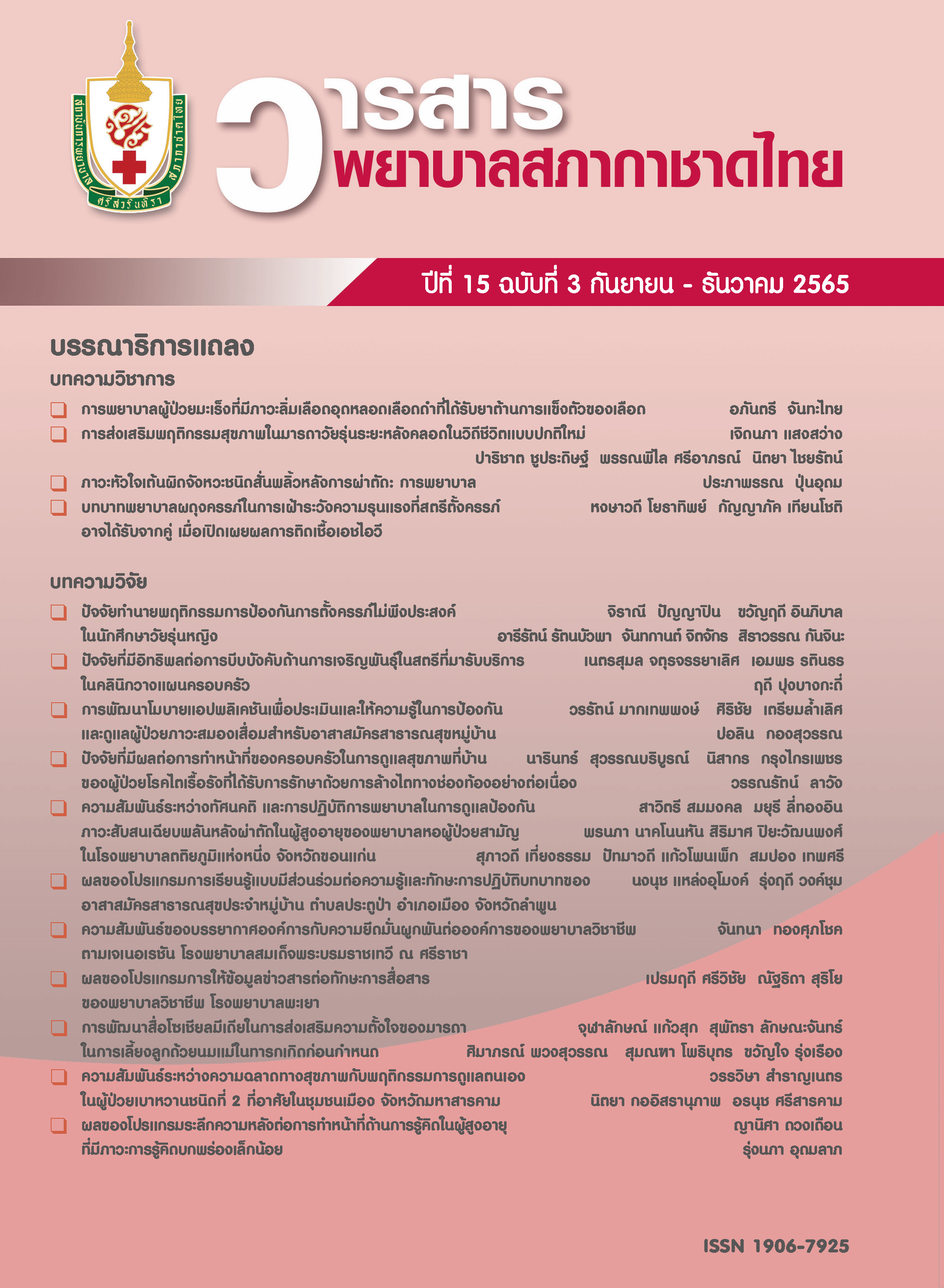The Effect of a Reminiscence Program on the Cognitive Function of Older Adults with Mild Cognitive Impairment
Keywords:
reminiscence program, cognitive function, mild cognitive impairment, older adultsAbstract
The purpose of this quasi-experimental research was to investigate the effect of a reminiscence program on the cognitive function of older adults with mild cognitive impairment. The subjects were older adults in the club of one in Bangkok, Thailand. The purposive sampling then assigned a matched pair group of 20 samples each to an experimental group and a control group. The experimental group participated in the group - implemented reminiscence program once a week for six weeks, while the control group received standard care. Data were collected at the pre - experimental phase, during the four weeks of the experimental period, immediately post - experiment, two weeks after the experiment, and four weeks after the experiment through the Montreal Cognitive Assessment (MoCA). The data were analyzed using Fisher’s exact test, the Wilcoxon signed - rank test, the Mann - Whitney U test, and the Friedman test.
The results showed that the reminiscence program increased cognitive function in older adults with mild cognitive impairment both during and after the program (p < .05). At both the 2 - week and 4 - week follow-up intervals, it was found that the cognitive functions of the older adults were higher than before the program at a statistically significant level (p < .05). When comparing the experimental group with the control group, it was found that the experimental group showed greater cognitive function during the program, immediately post - experiment, and at the 2 - and 4 - week follow-up intervals at a statistically significant level (p < .05).
References
Li M, Lyu JH, Zhang Y, Gao ML, Li R, Mao PX, et al. Efficacy of group reminiscence therapy on cognition, depression, neuropsychiatric symptoms, and activities of daily living for patients with Alzheimer Disease. J Geriatr Psychiatry Neurol 2020;33(5):272-81.
Griffiths J, Thaikruea L, Wongpakaran N, Munkhetvit P. Prevalence of mild cognitive impairment in rural Thai older people, associates risk factors and their cognitive characteristics. Dement Geriatr Cogn Dis Extra 2020;10(1):38-45.
Lenox-Smith A, Reed C, Lebrec J, Belger M, Jones RW. Potential cost saving to be made by slowing cognitive decline in mild Alzheimer’s disease dementia using a model derived from the UK GERAS observational study. BMC Geriatr 2018;18(1):57. doi: 10.1186/s12877-018-0748-9
Fogg D, Griffiths P, Meredith P, Bridges J. Hospital outcomes of older people with cognitive impairment: an integrative review. Int J Geriatr Psychiatry 2018;33(9):1177-97.
Zhu CW, Sano M, Ferris SH, Whitehouse PJ, Patterson MB, Aisen PS. Health-related resource use and costs in elderly adults with and without mild cognitive impairment. J AM Geriatr Soc 2013;61(3):396-402.
Connor MH, Seeher K, Teixeira-Pinto A, Woodward M, Ames A, Brodaty H. Mild cognitive impairment and caregiver burden: a 3-year-longitudinal study. Am J Geriatr Psychiatry 2019;27(11):1206-15.
Wang YQ, Jia RX, Liang JH, Li J, Qian S, Li JY, et al. Effects of non-pharmacological therapies for people with mild cognitive impairment. A Bayesian network meta-analysis. Int J Geriatr Psychiatry 2020;35(6):591-600.
Haight B, Gibson F. Burnside’s working with older adults group process and techniques. 4th ed. Sudbury, MA: Jones and Bartlett; 2005.
Duru Aşiret G, Kapucu S. The effect of reminiscence therapy on cognition, depression, and activities of daily living for patients with Alzheimer Disease. J Geriatr Psychiatry Neurol 2016;29(1):31-7.
Lin LJ, Yen HY. Efficacy of reminiscence therapy on cognitive functioning in older adults. Geriatr Rehabil 2018;34(2):112-7.
Bademil K, Lok N, Selcuk-Tosun A. The effect of reminiscence therapy on cognitive functions, depression, and quality of life in Alzheimer patients: randomized controlled trial. Int J Geriatr Psychiatry 2019;34(1):47-53.
Wongpakaran N, Wongpakaran T. Prevalence of major depressive disorder and suicide in long-term care facilities: a report from northern Thailand. Psychogeriatrics 2012;12(1):11-7.
Touhy TA. Communicating with older adults. In: Touhy TA, Jett K, editors. Ebersole & Hess’ toward health aging: human needs & nursing response. 10th ed. St. Louis, MO: Elsevier; 2020. p.68-76.
Synder M. Reminiscence. In: Synder M, Lindquist R, editors. Complementary/ Alternative therapies in nursing. 4th ed. New Yoke: Springer Publishing; 1998. p.143-51.
Spector A, Thorgrimsen L, Woods B, Orrell M. Making a difference: an evidence-based group programme to offer Cognitive Stimulation therapy (CST) to people with dementia. London: Hawker Publications; 2006.
Burnside I, Schmidt MG. Working with older adults: group process and technique. 3rd ed. Sudbury, MA: Jones and Bartlett Publishers; 1994.
Committee Conducted Mini-Mental State Examination (Thai-Version). The dementia project in Thai elderly 2000. Bangkok: Medical Department; 2000. (in Thai)
Jitapunkul S, Suriyawongpaisarn P. Health problems of the elderly in Thailand. Bangkok: Holistic Publishing; 1999. (in Thai)
Hemrungrojn S. MoCA cognitive assessment Thai Version [Internet]. 2007 [cited 2020 May 30]. Available from: https://www.mocatest.org/paper/
Wu LF, Koo M. Randomized controlled trial of a six-week spiritual reminiscence intervention on hope, life satisfaction, and spiritual well-being in elderly with mild and moderate dementia. Int J Geriatr Psychiatry 2016;31(2):120-7.
Downloads
Published
Issue
Section
License
Copyright (c) 2023 Srisavarindhira Thai Red Cross Institute of Nursing

This work is licensed under a Creative Commons Attribution-NonCommercial-NoDerivatives 4.0 International License.
เนื้อหาบทความหรือข้อคิดเห็นต่างๆ ในวารสารพยาบาลสภากาชาดไทยนี้ เป็นความคิดเห็นของผู้เขียนบทความ ไม่ใช่ความเห็นของกองบรรณาธิการ หรือสถาบันการพยาบาลศรีสวรินทิรา สภากาชาดไทย






